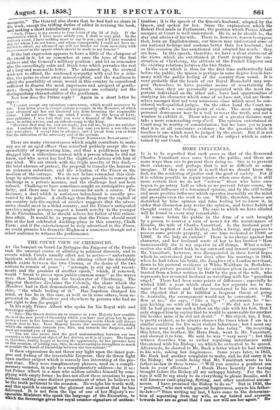THE COURT VIEW OF CHERBOURG.
AT the banquet on board La Bretagne the Emperor of the French took the unusual course of alluding to political discords, and to events which Courts usually affe-et not to notice—" unfortunate incidents which. did not succeed in altering either the friendship which exists between the two Crowns, or the desire of the two nations to remain at peace" ; "attempts to stir up old resent- ments and the passions of another epoch," which, if renewed, would " break to pieces upon public common sense" as the waves were then breaking upon the breakwater of Cherbourg. The Emperor therefore disclaims the Colonels, the share which the Manikip had in that demonstration, and, as they say in Lanca- shire, "the whole boiling of it." Has Napoleon changed his mind, or has he in this case, as well as in some others, been re- presented in the Moniletir and elsewhere by persons who had no just right to don the purple ?
In his reply Prince Albert who spoke for his Royal wife and. Sovereign said-
" ' Sire—The Queen desires use to express to your Majesty how sensible she is of the new proof of friendship which you have just given her by pro- posing a toast in her honour, and by pronouncing words which will always remain dear to her. Your Majesty knows the sentiments of friendslup which she entertains towards' you, Sire, and towards the Empress, and I
need not remind you of them. -
"'You are also aware that the good understanding between our two countries is the constant object of her desires, as it is of yours. The Queen is, therefore, doubly happy at having the opportunity, by her presence here OR this occasion, of joining you, Sire, in endeavouring to strengthen as much as possible the bonds of friendship between the two nations.'" If these expressions do not throw any light upon the inner pur- pose and feeling of the inscrutable Emperor, they do throw light upon another subject which is scarcely less interesting at the pre- sent time. They were complimentary phrases, used on a compli- mentary occasion, in reply to a complimentary address—be it so ; but Prince Albert is a man who seldom satisfies himself by com- plying with empty forms ; he does not allow these occasions to pass Without making some distinct presentment of what he believes to be the truth pertinent to the occasion. He weighs his words well, and this speech is amongst the plainest and neatest that he has delivered. It is not from the lips of one of her Majesty's re- sponsible Ministers who speak the language of the Executive, to Which the Sovereign gives her royal counter-signature of authen-
tioation; it is the speech of the Queen's husband, adopted by the Queen, and spoken for her. Since the explanation which Sir Robert Peel made in Parliament, the position which Prince Albert occupies at Court is well understood. He is, as he should be, the stay and adviser of his wife. There is, however, reason to suppose that, born an Englishwoman, our Queen may understand some of our national feelings and customs better than her husband ; but on this occasion she has sanctioned and adopted his words : they are here. In this speech, therefore, we have a clear statement of the views which are entertained at Court respecting the con- struction of Cherbourg, the attitude of the French Emperor and. the existing relations between the two States.
In the view which is thus for the first time authentically laid before the public, the Queen is perhaps in some degree less in har- mony with the public feeling of the country than usual. It is very probable that the heads of our Royal Household may sup- pose themselves to have peculiar means of ascertaining the truth, since they are personally acquainted with the most im- portant individual on the other side, have had opportunities of studying his character which some of us have not, and are them- selves amongst that not very numerous class which must be con- sidered well-qualified judges. On the other hand the Court ne- cessarily offers a one-sided point of view. The most engaging personal demeanour may be a veil to cover the truth, and not a window to exhibit it. Those who are at a greater distance may take a more commanding coup d'aql. The opinion entertained at Court may be worthy of consideration ; but we have yet to learn that it is at all conclusive evidence ; for the question which it touches is one which must be judged by the event. But it is not uninteresting to be told the view of the subject which is enter- tained by our Court.


























 Previous page
Previous page